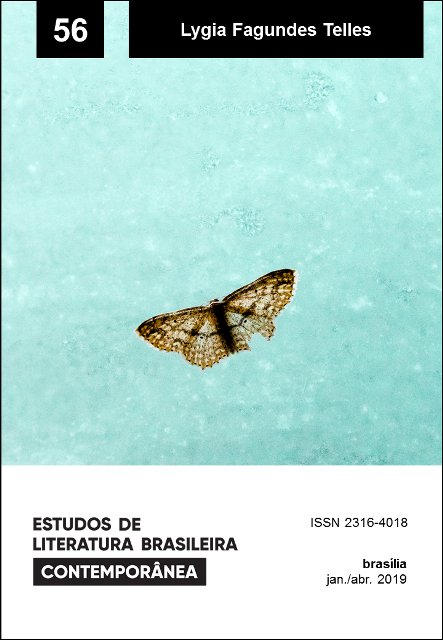One step away from the anti-bird: the poetry of Orides Fontela
DOI:
https://doi.org/10.1590/2316-40185617Keywords:
Brazilian modern poetry, Orides Fontela, metalanguage, memory, poetry, realityAbstract
Orides Fontela, one of the important names of Brazilian poetry in the second half of the twentieth century, left a work composed of few titles, but always admired by critics. Since its debut in the late 1960s, Oridian production has revealed, alongside the tendency toward abstraction and transcendence, an acute understanding of the materiality of existence and the obstacles that make up the real world. This essay tries to emphasize, as essential aspects of Fontela’s poetry, the presence of memory, the quotidian and the real ”“ manifested, for example, in the recurrence of the symbol of blood. This essay also emphasizes the author's critical awareness of poetic creation, considered to be both rational and intuitive, demonstrating, from the point of view of literary history, her strong connection with the modern Brazilian tradition, notably with the poets Carlos Drummond de Andrade and João Cabral de Melo Neto.
References
BUCIOLI, Cleri Aparecida Biotto (2003). Entretecer e tramar uma teia poética: a poesia de Orides Fontela. São Paulo: Anablume; Fapesp.
CANÇADO, José Maria (1996). A eutanásia da biografia. Folha de S. Paulo, São Paulo, Caderno Mais, p. 12, 12 maio.
CANDIDO, Antonio (1983). Prefácio. In: FONTELA, Orides. Alba. São Paulo: Roswitha Kempf, p. 3-7.
CANDIDO, Antonio (1988). Orelha. In: FONTELA, Orides. Trevo. São Paulo: Duas Cidades.
CASTELLO, José (1996). Orides Fontela resiste à sofisticação da poesia. O Estado de S. Paulo, São Paulo, Caderno 2, p. 115, 1º jun.
CHAUÍ, Marilena (1996). Prefácio. In: FONTELA, Orides. Teia. São Paulo: Geração, p. 9.
CHEVALIER, Jean; GHEERBRANT, Alain (2008). Dicionário de símbolos. Tradução de Vera da Costa e Silva (et al.). Rio de Janeiro: José Olympio.
DANTAS, Vinicius (1986). A nova poesia brasileira e a poesia. Novos Estudos CEBRAP, São Paulo, v. 3, n. 16, p. 40-53, dez.
FARIA, Álvaro Alves de (2006). Tristeza difícil de apagar. Rascunho, Curitiba, n. 77, set.
FERREIRA, Letícia Raimundi (2002). A lírica dos símbolos em Orides Fontela. Santa Maria: Associação Santa-Mariense de Letras.
FONTELA, Orides (2006). Poesia reunida (1969-1996). São Paulo: Cosac Naify; Rio de Janeiro: 7 Letras.
FONTELA, Orides (1991). Nas trilhas do trevo. In: MASSI, Augusto (Org.). Artes e ofícios da poesia. Porto Alegre: Artes e Ofícios, p. 255-261.
FONTELA, Orides (1997). Uma ”“ despretensiosa ”“ minipoética. Cultura Vozes, ano 91, n. 1, p. 118-125, jan./fev.
FONTELA, Orides (1998). Sobre poesia e filosofia ”“ um depoimento. In: PUCHEU, Alberto (Org.). Poesia (e) filosofia. Rio de Janeiro: 7 Letras, p. 13-16.
LISPECTOR, Clarice (1999). A hora da estrela. Rio de Janeiro: Rocco.
MARQUES, Ivan (2000). Orides: a um passo do pássaro (documentário). São Paulo: TV Cultura, 26 maio 2000.
MASSI, Augusto (1986). Uma obra feita em espiral. Folha de S. Paulo, São Paulo, Caderno Ilustrada, p. 61, 9 ago.
MELO NETO, João Cabral de (1994). Poesia e composição. In: MELO NETO, João Cabral de. Obra completa. Rio de Janeiro: Nova Aguilar.
OSAKABE, Haquira (2002). O corpo da poesia. Notas para uma fenomenologia da poesia, segundo Orides Fontela. Remate de males, Campinas, n. 22, n. 2, p. 97-109.
RIAUDEL, Michel (1998). Entretien avec Orides Fontela. In: QUINT, Anne-Marie (Ed.). Le conte et la ville: études de littérature portugaise et brésilienne. Paris: Presses de La Sorbonne Nouvelle.
SÜSSEKIND, Flora (2002). Seis poetas e alguns comentários. In: SÜSSEKIND, Flora. Papéis colados. Rio de Janeiro: Editora da UFRJ.
VILLAÇA, Alcides (1992). Símbolo e acontecimento na poesia de Orides. Novos Estudos CEBRAP, São Paulo, v. 3, n. 34, p. 198-2014, nov.
VILLAÇA, Alcides (1996). O silêncio de Orides. Folha de S. Paulo, São Paulo, Jornal de Resenhas, p. 7, 12 jul.
Downloads
Published
Issue
Section
License
Authors who publish in this journal agree to the following terms:
a) The authors maintain the copyright and grant the journal the right of first publication, the work being simultaneously licensed under the Creative Commons Attribution License-Non Commercial 4.0 which allows the sharing of the work with acknowledgment of the authorship of the work and publication this journal.
b) Authors are authorized to enter into additional contracts separately, for non-exclusive distribution of the version of the work published in this journal (eg publish in institutional repository or as a book chapter), with authorship recognition and publication in this journal.
c) Authors are allowed and encouraged to publish and distribute their work online (eg in institutional repositories or on their personal page) after the editorial process, as this can generate productive changes, as well as increase the impact and citation of published work (See The Effect of Free Access).
d) The authors of the approved works authorize the magazine to, after publication, transfer its content for reproduction in content crawlers, virtual libraries and the like.
e) The authors assume that the texts submitted to the publication are of their original creation, being fully responsible for their content in the event of possible opposition by third parties.


